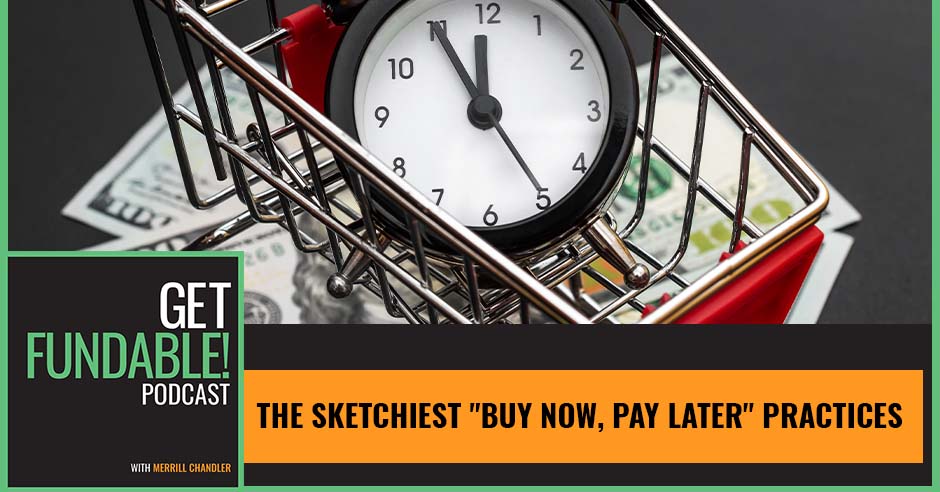
Nowadays, people would often splurge on what item is on trend. It could be the newest phones, gaming consoles, sought after skills trainings, etc. However, due to the lack of funds in their wallet, they cannot purchase some pricey items. Then come special sales and different payment methods, one being the overly-hyped “Buy Now, Pay Later” scheme that attracts people who don’t put much thought to what they are getting into. In this episode of The Fundability™ Podcast, host Merrill Chandler talks about how today’s Buy Now, Pay Later scheme is getting sketchier and sketchier.
—
Watch the episode here
Listen to the podcast here
The Sketchiest “Buy Now, Pay Later” Practices
In this episode, I get mad. I go off on lenders and their lack of implementing fiduciary responsibility. We won’t define it now but lenders are looking to skate through and use the lack of sophistication of borrowers to take advantage of profits, fund and various purchases, especially training programs to capitalize on the ignorance of borrowers and create unnecessary debt for borrowers, especially in this case, students. I will see you on the inside.
—
This episode is about how the buy now, pay later is getting super sketch. No joke. We’re going to be discussing buy now, pay later. It’s also known as BNPL. It’s going everywhere. PayPal, Afterpay, Klarna and Affirm are organizations that are offering services to merchants and companies everywhere from Amazon, furniture stores, Target and Apple equipment. They are allowing them like they take a Visa or MasterCard and run that card or input that information. It goes onto a credit line or a credit limit. You make payments until it’s paid to zero.
These are more installment loan versions. A credit card is a revolving account. Charge it up, pay it off. These are not revolving accounts in most instances. These are many installment loans. Buy now, pay later means 2, 3, 5 or 6 payments of equal monthly installments to retire whatever purchase price. Let’s say you go to a Nordstrom and they say, “Would you like to put this on your buy now, pay later?”
Instead of paying $200 now, it’s 4 payments of $50. Buy now, pay later services do not cost you, the borrower, the consumer and the buyer, anything. These fees are paid by the merchant. The merchant accepts the fact, “I’m going to use Klarna. It is going to make it easy for people to buy my goods. It’s worth the 3%, 5%, to 10% that they charge.” Buy now, pay later is more expensive than the 3% to 5% charged by Visa and MasterCard or the processing fees by Visa, MasterCard, Discover and American Express credit card processing services.
Two different. One adds to a credit card limit. This buy now pay later is an installment loan. It’s the first thing we need to understand. They’re trying to go for market share, this buy now pay later institutions or companies so all the sketchy people start coming out of the woodwork. We’ll cover some of the older ones but the most insidious is the individual that is paid for education classes or schooling.
You can choose lower costs if you pay as collected, or they may pay upfront. Share on XHere are some examples of the research that we gathered. In some of the instances, there was a $15,000 tattooing course. Become a tattoo artist and if you spend $15,000 with us, we will teach you how to become a tattoo artist. Buy now, pay later split that up over a twelve payment. It is $1,200 a month to pay for this education. It’s not certified. They’re not a certified education centers like universities and junior colleges. They’re random businesses that are using education. Think of it as a trade school.
Cosmetology is a big one that’s being affected. To become a cosmetologist, you spend $10,000 with us. Get certified by your state standards to become a cosmetologist, a hair stylist or an aesthetician. We’ll split up your $10,000 tuition over 12 months at $833 a month. The problem is that the Consumer Finance Protection Bureau is coming down hard on these non-certified education offerings in Klarna, PayPal and Afterpay. All these people are saying, “Let’s finance it over time and get people into debt.” Here’s where the conflict is. All of these companies, Klarna, Affirm and PayPal, are all saying, “No, we vet the borrowers.”
What’s happening is that the underwriting criteria, the debt-to-income ratio, how much debt load and all of the underwriting that normal people go through when they get a credit card or a real installment loan are not abiding by traditional lending mythologies. They’re taking these on in what is being called shadow student debt. Shadow in the sense that they’re not certified schools. They’re for-profit companies that have these training programs but they’re getting more people into debt.
If you remember, in the ‘90s, 2000s, 2010s and the last few decades, student loans were used for all of these different trade schools. Some of them were certified and some of them not but people were getting tens of thousands of dollars of student debt and the services or the schools were subpar or horrible. There was this entire brouhaha where the Consumer Finance Protection Bureau said, “No, you don’t get to abuse consumers by not educating them on the risks of engaging these money sources.”

Buy Now Pay Later: Pay for Pay education classes are just random businesses using education to trade.
They put a kibosh on all these non-certified. There are massive rules set up by the CFPB. For someone to be able to get a real student loan, it has to be a certified school and has to have a certain number of students. You can’t have ten students in your school. There has to be a certain size, quantity and quality of the educational institution.
These for-profit non-certified education training schools pop up. They’re engaging these financial institutions like Klarna, Afterpay, Affirm and PayPal to finance their schools again. We’re right back into the 1990s when it was a cluster mess of abuse for uneducated or unsophisticated borrowers, not knowing what the real cost of these financial packages is going to be.
It looks cool, $10,000 divided by $831 over the month. Remember, the schools that are using these financing options are selling the idea that 92% of our people are hired within 2 months after they graduate from our program. Without any documentation and bonafide, their claims are true. That’s what part of the certification process for an education organization requires. You have to showcase in point that when you say 92% of our people are hired within 3 months after they graduate, you’ve got to show the bonafide and proof. You have to show that what you are saying is true or you don’t have your certification.
None of these organizations are doing that. I’m picking people from random. Tattoo artists, cosmetology school, fly fishing school, whatever the devil they’re signing up to learn, they’re being sold this bill of goods that there’s no proof that the affirmations by the school are true or accurate. The money supply is investor pools. Klarna, Afterpay, Affirm and PayPal are not banks. These are investor pools with actuarial tables.
One of the worst things here is that they say, Oh, it's interest-free. Share on XThey’re actual lending criteria is they may be profitable because they only pay the schools as collected. You can choose lower costs if you pay as collected or they may pay upfront. Some of these schools are only paying as collected. It’s profitable to these organizations. Every single payment that’s made is profitable to the school because they have this stream of income over 6 to 12 or more months.
In 2020, this was getting so bad that the advocacy group called the Student Borrower Protection Center put out a report. PayPal was the first one in the game because, as we know, buy now, pay later has arisen since COVID in 2020. They listed 150. If you want to Google it, Student Borrower Protection Center, there’s a report available of the 150 schools. There are “150” of these training companies that were pot-listed.
PayPal put a kibosh on all 150 of them. Right afterwards, Klarna, Affirm and Afterpay went in there and started financing the same 150 that were on this list of the suspect or poor students that were being marketed to and/or misinformed about the benefits of a particular school or its certification. Some of these schools are even using different terms than certified like approved and authorized. They’re using BS words to get the borrower, the student and the buyer to believe them.
You know that my entire end game is borrower education and it’s a big hill to climb because we’re fighting against the profit motive of what can be unscrupulous organizations who are saying, “We’re the money. We’re not vetting the borrower. That’s somebody else’s problem. We’re not vetting the student. That’s the schools. We’re the money.” BS, there’s what’s called fiduciary responsibility.

Buy Now Pay Later: They have to be the fiduciary and honor and respect the limitations and/or unsophistication of the borrower.
Fiduciary responsibility means that the more knowledgeable and powerful party in an arrangement takes care of the interest of the less knowledgeable or powerful party in the arrangement. Lenders, by definition in this country, have a fiduciary responsibility to take care of the borrower. That doesn’t mean the borrowers don’t get to get educated until everybody is as smart in this system. When they’re done with our training and done reading every blog you are reading, we know more so we can take care of ourselves but until that moment, to be a lender in this country, they have to be the fiduciary. Honor and respect the limitations and/or unsophistication of the borrower.
That is not happening. I want to mad props to PayPal. The second they got the list of this notice and did their due diligence, they pulled funding from 150 organizations. They stopped offering to fund. Mad props to PayPal for seeing the truth and not focusing on the bottom line as much as their fiduciary responsibility to take care of borrowers in this country.
I’m calling out Klarna, Affirm and Afterpay to join PayPal in making sure that you perform your fiduciary responsibility to borrowers in making sure that who you offer your financing services to are reputable and have the best interest of the borrower in mind. You are the money and the facilitator. You make it happen. Without the money, the training and the trainee are not going to join forces. As a facilitator, you got to take care of the borrower.
One of the worst things here is they say, “It’s interest-free if you pay the entire amount in 90 days, 6 months or 12 months.” If you don’t pay in the agreed-upon term of 3 months, 6 months or 12 months, they retroactively add interest back to day zero, which is a premium interest rate for not keeping your agreement. Wax the borrower with way more charges than they perceived in the original agreement. I am not taking the responsibility to be smart and sophisticated of the borrower but we got to give the borrower a little bit of time to get through the fundability training so that they know what gain is afoot.
Go to Get Fundable Facebook page, put in questions, give us notes and tell us what you’re up against. We will reach out to you. We want you to have the power and worst case, go to www.FundabilityMasterCourse.com and get educated. You need to save yourself from all this freaking financial pain and suffering. Avoid the landmines that are blowing up your current and future opportunities.
Be careful of buy now pay later because it is a seductive way to pay for a purchase. If you do 2 or 3 more than you can handle, you are in way more debt and you’ve obligated yourself way above and beyond. I’m not taking responsibility for you, the borrower. I am putting the responsibility on the lender. We’ll see you next time.




